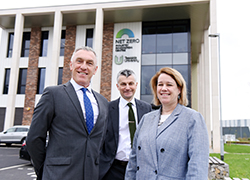Teesside University expertise brings millions to regional businesses
Businesses working with Teesside University through Knowledge Transfer Partnerships (KTPs) are generating hundreds of thousands of pounds worth of increased profit each year.
The University is being recognised as a national example of excellence in working with businesses and has held the UK KTP conference in 2013.
Teesside University can reveal that more than £3m in five years is projected to be put into regional industry profits as a result of KTPs, which involve graduate delivery of a strategic change within a business with support from an academic expert.
These partnerships are designed to inject innovation into industry and deliver a big impact on business profitability.
The success of Teesside University KTPs is demonstrated by independent assessors who in the last five years have given 82% of Teesside University’s Knowledge Transfer Programmes 'outstanding' or 'very good' grades, compared with a national average of 55%.
Geoff Archer, Knowledge Transfer and Commercialisation Manager, said: 'At Teesside University we value the fact that many of our KTPs, and the regional model Knowledge Exchange Internships (funded by ERDF) create jobs and implement innovation within businesses. 'KTPs recruit talented people to spearhead new projects, give businesses access to experts who can help take their business forward and develop innovative solutions to help their business grow.
'The expertise skilled graduates offer, and the support they receive from their academic experts, makes a big impact on businesses.
'It can really help them to increase their competitive advantage to improve their performance and increase profitability.'
Ryder Architecture, based in Newcastle, is onto its second KTP with Teesside University.
Following on from a Grade A rated KTP for a Building Information Modelling (BIM) project that ended in 2011, the firm is now working with graduate Graham Kelly on a new KTP.
This KTP is to model and incorporate information and knowledge of building operations at the design stage to make it easier to manage a build once it is underway.
This information at building design stage helps with cost efficiencies and helps reduce costs later down the line associated with building refurbishments and renovations.
Architectural Director Peter Barker said: 'We are delighted to build on the success of our first KTP with Teesside University which was awarded ‘outstanding’ status upon its completion in 2011.
'Our latest KTP is allowing our organisation to acquire a significant competitive edge at this exciting time for the development of digital engineering to support facilities throughout the life cycle and to export our skills to emerging international markets.'
Professor Nash Dawood is supporting Graham to deliver the Ryder Architecture KTP through the Technology Futures Institute at Teesside University. He has delivered three KTPs in total and is currently involved in a further three.
He states: 'The key to delivering a successful KTP is understanding what a business needs and how a graduate can deliver that, supported by academic staff.
'Often I will approach a business once I’ve seen what they’re doing and I think ‘we can improve that’.
'KTPs inject new life into a business and new thinking that can really revolutionise how they work.
'The impact of a KTP on a smaller business can be nothing short of phenomenal.'
KTPS are part-funded by the Technology Strategy Board. A small to medium-sized enterprise (SME) is expected to contribute 33% of the costs involved in the project and large companies are expected to contribute 50%.
 International partnership signed with prestigious American
...
International partnership signed with prestigious American
... Teesside University academics join prestigious network of
...
Teesside University academics join prestigious network of
... Curatorial studies culminating with international art
...
Curatorial studies culminating with international art
...